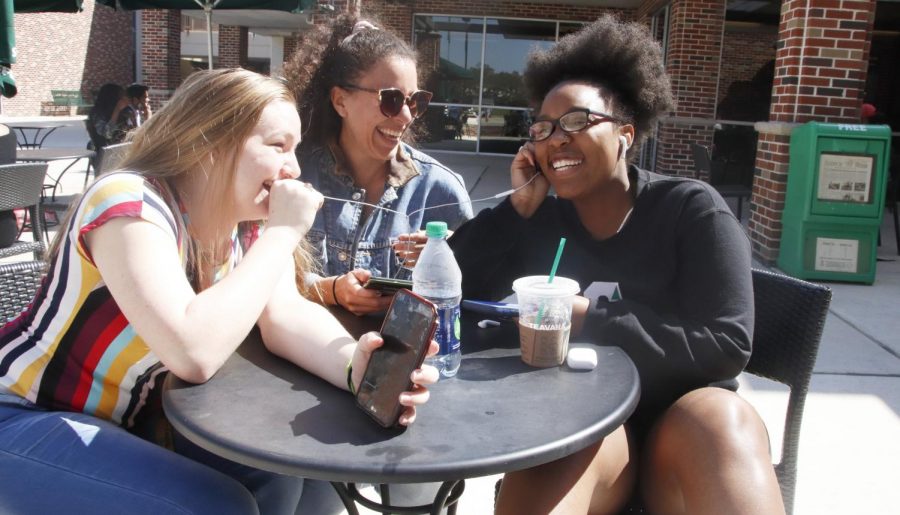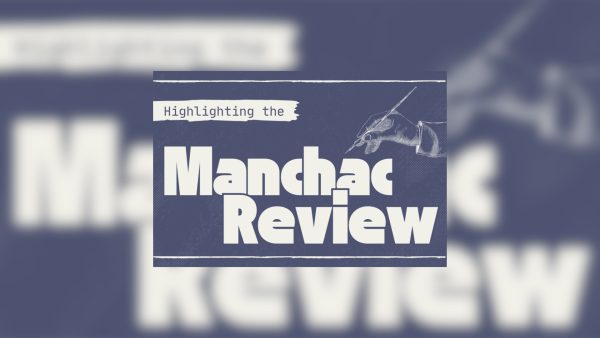Judging others based on musical preferences
Maiah Woodring/The Lion’s Roar
Victoria Wade, a freshman biological sciences major, left, Abigail Street, a junior English major, middle, and Karin Perry, a freshman criminal justice major, right, listen to music through earphones. All three appreciate gospel music.
Some people are judged based on their musical preferences, which sometimes give rise to negative or humiliating opinions, a phenomenon known as “music shaming.”
Judging a person’s socioeconomic status or intelligence by their musical choices can lead to unpleasant experiences. Dr. Philip Schuessler, an instructor of theory and composition, enjoys contemporary classical music. Having experienced music shaming himself, he explained the phenomenon is prevalent in modern society.
“People do have a tendency to associate a person’s personal characteristic or traits with a kind of art that they enjoy, which is a little strange,” said Schuessler. “It’s a little off-putting ‘cause they tell you something about that person, but they don’t always tell the full picture. So, I think that people have a tendency to want to easily define people, and so, that’s one way of doing it, unfortunately.”
When Schuessler finds himself defining people based on their music preferences, he tries to catch himself.
“I try to keep an open mind about different types of music, even if it’s not my cup of tea,” stated Schuessler. “I try to understand that there’s a place for it and there’s a reason a lot of people like it. And if I don’t like something, instead of just outright dismissing it, I try to ask myself why I don’t like it and try to learn more about the music.”
Dr. Jeffrey Wright, head of the Department of Music and Performing Arts, agreed that music shaming is undesirable. Wright made a distinction between the generalizations called stereotypes and the humiliating judgments that make up music shaming.
Wright said, “It’s important to realize, and I bring this up in courses I teach, that some of that stereotyping is there because of music’s close association with people’s both individual and communal identities, that this music does speak to some groups of people, but that doesn’t necessarily mean it’s only for that group of people.”
A person’s musical choice can reveal more about them in a positive manner.
“Knowing about a person’s music, if you’re doing it with an open mind, lets you know that person better,” shared Wright. “If you understand their musical tastes or what certain musical genres mean to them, you don’t have to judge them. You can actually use it as a way to get to know them. So, I’m very much against music shaming in any way, but instead I think we should use music as a way to get to know each other and build community versus using it as something that divides us into cliques.”
Overcoming the habit of music shaming requires personal responsibility, according to Wright.
“Listen to various types of music,” shared Wright. “Listen to music that you’re not familiar with.”
Wright feels that people are narrowing their horizons by confining themselves to their own music.
“I think part of what has maybe caused some rise with musical judgments or musical shaming is that everybody has an MP3 player now in their phone and cordless headphones,” expressed Wright.
Exposing themselves to a wide range of music might help people overcome the problem of music shaming.
“If personally you define your musical interests very narrowly, you never get exposed to this wealth of other music out there,” explained Wright. “And especially in today’s technological climate where music from all around the world is more accessible than it’s ever been, I think we should use that to explore music, not to judge others based on music.”
Your donation will support The Lion's Roar student journalists at Southeastern Louisiana University.
In addition, your contribution will allow us to cover our annual website hosting costs.
No gift is too small.





